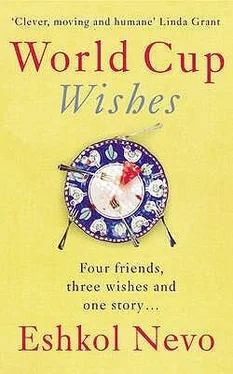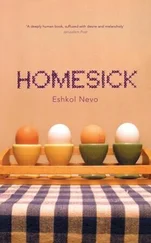And she felt it. She felt that something was going on inside me. And tried to ferret out what it might be: how was it in Haifa? How’s Amichai?
The same, I grumbled.
It’s nice of you to go there every day, she said. And I said, almost shouting, what does nice have to do with it? He’s my friend. That scared her, of course, and she said, that’s what I meant. After a short silence, she added, is everything all right? You’re a bit distant today. And I looked her straight in the eye and confessed bravely that I was still in love with another woman. And it left no room in my heart for someone new.
I’m putting a nice face on things again.
I didn’t confess anything to her. I said I was tired, that’s all. And we’d talk tomorrow. But the next day, I didn’t answer her calls and didn’t reply to her messages. And the day after that too.
I took the cowardly way. With velvet cruelty.
And on the morning of the third day, she reached me. You’re on the way to Haifa, she said.
Yes, I admitted.
Today’s the last day of the shiva, right?
Right.
Would you like me to go with you?
No, I don’t think so.
She was silent on the other end of the line and I thought that if this conversation gets any longer, I’d leave too late and get stuck in traffic.
I wanted to ask … she hesitated.
Yes? I urged her.
My girlfriends tell me that you’re trying to break up with me. That this is how it works with you secular people. You know I have no experience in such things.
I felt a warm affection for her rising inside me despite myself. And perhaps that was why, wanting to suppress that warm, mutinous affection, I gave her a particularly nasty answer.
Perhaps your girlfriends are right, I said. (It would have been bad enough to say, ‘Your girlfriends are right.’ But by prefacing it with ‘perhaps’, I planted a slight doubt, something to hold on to, the way you hold on to a drifting plank of wood in the middle of the ocean until you freeze to death.)
*
That day, the road north looked more beautiful than ever. The wind blowing through the window was just cool enough to keep me from having to turn on the air conditioning. I felt as if I’d done the right thing. I’d said no to concessions. No to compromise. No to cold love.
Although around Hadera, perhaps because of the electric power station, my feelings got completely turned around and for a few minutes I felt I’d missed an opportunity with Hani. That there’d been a moment there, on New Year’s Eve, when my heart almost opened to her. And that it’s easier to fantasise about old loves than to truly embrace new love. But when the song on the radio ended and the ads started, that temporary feeling was replaced by the previous one. The more comfortable one.
I pondered this reversal of feelings until Atlit. And how hard it is to know something for sure. And how almost everyone close to me finds it hard to know what he really feels, and fools himself endlessly, and perhaps that’s only a generational thing, perhaps the number of distractions and options our generation has confuses us so much that we lose our inner path, unlike our parents, who knew what they wanted because they didn’t have many choices, although who knows whether there wasn’t a great sadness concealed behind all that, or at least a vague sense of missed opportunity we couldn’t make out because we were children and unable to see what they were really like (or we could see and preferred, for our own good, not to?).
From Atlit, all those theoretical musings were replaced by a much more practical question: would Ya’ara be there on the last day of the shiva?
IN YA’ARA’S ROOM in her parents’ house, there was a huge picture of her as a child. And when I say huge, I mean an actual poster that hung above her bed in a red frame. I remember that the first time we slept together in that room, I could feel Ya’ara the child watching us, which added a certain element of perversion to everything that happened between us that night. The Ya’ara in the poster was a beautiful girl with caramel-coloured hair and a ribbon in it, mischievous, not entirely innocent eyes, and light-skinned calves that emerged from her short, dark jeans. But not even all that beauty explained the enormous size of the poster and the fact that it continued to hang in her room long after her childhood had ended.
Don’t look for explanations, Yuval. I left that picture on the wall just because it makes me feel good, that’s all, she answered when I asked.
Those visits to her parents’ home in Rehovot also made her feel good. She didn’t understand why my trips to Haifa were steeped in a sense of disappointment even before I set out. And why every time we left to go back to Tel Aviv, I would heave a sigh of relief. OK, they really did treat her like a princess in her house. She had three older brothers who were a bit in love with her, and were thrilled to see her whenever she made her entrance. So tell me, brother, can you still see your feet? she’d tease the eldest brother as she rubbed his architect’s swelling pot belly. Then she would sniff her second brother’s cheeks and say that his aftershave made her dizzy, simply made her dizzy. And finally, she and the third brother would give each other the special ‘swan’s hug’ they’d invented when they were kids, where one of them thrust their neck into the hollow of the other’s neck.
The three brothers competed to see who could compliment her more, make her laugh more and pamper her more. But none of them had a chance against her father, who was both her strict boss at work and her chief admirer at home. And something in all that inspired Ya’ara with confidence in her femininity, and gave her some very practical knowledge about how men worked. Yet there was something about it that diminished her. That trapped her in the geisha role and drew her to it with silk threads again and again, even when something inside her wanted very much to escape.
At home, they called her little Ya’ara. She took gender courses and talked about independence and feminism and self-realisation, and she had a clearly defined opinion on almost every subject, but they continued to call her little Ya’ara and treat her with admiration that bordered on patronising.
She didn’t feel that. She loved it when they called her little Ya’ara and loved going there for Friday night dinners, and I loved her and wasn’t sure that my entire diagnosis of her family wasn’t just a cover for the jealousy I felt because she had such a happy family and I didn’t. And in any case, I knew that she’d soon put together her ninety-one thousand dollars, stand on the moving walkway at the airport waving goodbye to her father and all her brothers and take off for London to fulfil her dreams. And at some point, I would join her in the white, warm apartment she’d have in Golders Green because it’s always good to have someone with you who speaks English fluently. And because we’d still be a couple, of course.
*
I have only five or six pictures of the grown-up Ya’ara. And just one of us together, taken on the outing in Haifa that I planned for us.
It was a few weeks after we’d started going out and I wanted to show her that Haifa wasn’t what she thought, so I convinced her to take a day off and we drove north, and at Atlit we turned right so that our first entrance into the city would be on the winding, forested Beit Oren road, and she said, wow, this is like being in another country, and I said, wait, you ain’t seen nothin’ yet, and I stopped for a few minutes at that spot, at the crest of the mountain where you can see both sides of the sea, and then we drove down along the route of my childhood, the Moriah road, to the Bahai Temple, whose opening hours I’d checked in advance, and we parked there, in the large observation garden, and caught our breaths at the sight of the glittering white marble steps that had been carved with such mathematical precision, and at the beautifully tended, brightly coloured gardens that surrounded us with their symmetrical forms, and then we surreptitiously joined a group of tourists to hear the Bahai guide explain that ‘the beauty of the gardens is meant to act on their beholder like background music and create an unconscious harmony that will enable him to listen to himself’. I wonder what they’re hiding under these gardens, Ya’ara whispered, and when the group had moved away a bit, she put her head on my shoulder and said, but you know, that whole business about unconscious harmony really works, ever since we came here, I’m a lot calmer, and I said, shame there’s no Bahai branch in Tel Aviv, and she kissed me on the mouth and said, thanks, thanks for showing me all this beauty, and later, when we left, she smiled and said, maybe you’ll become a Bahai? You’re organised too, an aesthetics freak, and I said, not a bad idea, there’s just one small problem, I think the Bahais are only allowed to be with other Bahais, and she laughed, for you I’m ready to be a Bahai too, and then we walked hand in hand to the panoramic promenade I’d already strolled along with other girls, promising myself that one day I’d come back here with one that I truly loved, and here I was, and here was Ya’ara. Look down, I told her, that’s the port, I said, and on the other side, you can see the old city of Acre, and there in the distance are the Galilee mountains, and even further away is Syria.
Читать дальше












